In my recent trip to Hong Kong, I was quite curious to go see the protests. I was a little worried, not for my safety, but for for the trouble the protests would make in traveling. I had heard that the streets were blocked, and even the subway had stopped running to certain parts of the city.
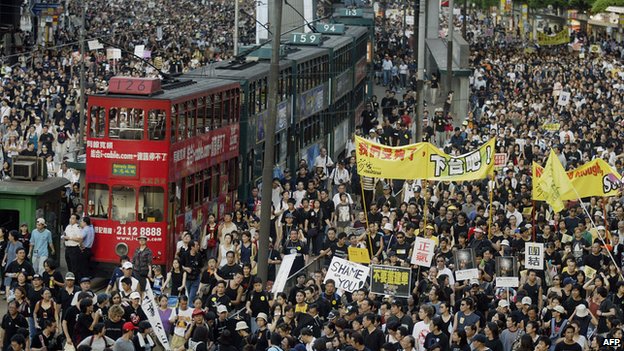
That was true, but only just kinda. (I had no problems with transportation anywhere.) The protests started almost a month ago and by the time I arrived they were clearly losing steam. The movement was called “Occupy Central” but Central (a part of Hong Kong island) was devoid of any protester activity. The area near my hostel, Causeway Bay, had some very sleepy activity. The most active part was in Mong Kok, which isn’t actually on Hong Kong island. (Like New York City with the different boroughs, Hong Kong is divided into several parts. Hong Kong island is just one of the parts, and is well, an island. Duh.) Mong Kok is on the mainland part in an area called Kowloon.
So what are the protests about?
When Britain handed HK back to mainland China in 1997, the two governments signed an agreement saying that Hong Kong would remain a special economic zone. Officially called “One Country, Two Systems” it separated Hong Kong both politically and economically from mainland China. (For instance, the bank system is totally different. If you use, say, Bank of China in Hong Kong, it is actually a separate company than Bank of China on mainland. I had to pay an “international surcharge” when I took money out of my Chinese bank, at my Chinese banks ATM in Hong Kong.)
And for the most part, Beijing has left Hong Kong alone, which you can tell when you go there. It has a very different feel and attitude than China. But in the past few years, things have been changing, and pressure has been tightening.

There have been several scuffles between Hong Kongers and mainlanders in recent times. Specifically, as more and more mainlanders are flooding into Hong Kong for shopping and economic opportunities, the HK’ers are fighting back. First I heard HK’ers were protesting pregnant mainlanders coming to HK to have their babies. (If you have a baby in HK, you are not under the “one-child” restriction. So many people were coming over they were flooding the maternity wards, making it harder for HK’ers to have their babies.) And several months ago, the internet erupted over “pee-gate.” (This was a scandal in which a mainland parent allowed her kid to pee on the streets–a common practice here in China. But some local people admonished the parents and the whole thing was caught on video which went viral. Then mainlanders actually supported the peeing kid which caused a bigger backlash in Hong Kong against the rudeness and unsanitary behavior of mainlanders. It would all be hilariously ridiculous if it wasn’t true.)
So, in general, tempers are simmering just below the surface. Like New Yorkers in America, Hong Kongers feel like they are more educated and cultured than their mainland counterparts and resent the “locusts” (as the call mainlanders) from taking over their streets and resources.
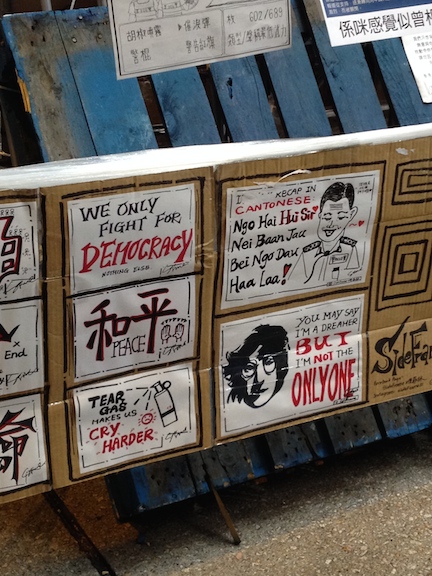
So last month when Beijing reiterated it’s control over Hong Kong, saying it would only allow elections of officials approved by the Beijing Government, the shit hit the fan. The “One Country, Two Systems” policy clearly states free elections in 2017. But Beijing wasn’t going to allow it totally. And that’s when things got crazy.
Tens of thousands of people took to the streets, setting up road blocks so no traffic could move. The police responded with violence, throwing tear gas and pepper spraying the crowd, which the protesters used umbrellas to shield themselves from (earning the protest the nickname “The Umbrella Revolution.”)
The government quickly realized the violence was a bad idea, and backed off. And the protests have been largely peaceful. Students sit and do their homework, or read books as they occupy the streets, and protesters are cleaning up after themselves and even recycling. I saw a scuffle with someone and the police, just a small thing in which the police grabbed someone and started pulling him away. But the dozens of onlookers, with dozens of cameras taking video, started shouting and the police stopped and just said some angry words.
Another time I saw a group of policemen just sitting around, chatting, smiling and laughing. So they were clearly not stressed out.
My friend at a Hong Kong university said the school is supporting the protests. Teachers wore yellow ribbons on their clothes (another symbol of the protests) and encouraged students to join the protests. I went to her school and saw hundreds of handmade Occupy Central signs pasted on every available wall.
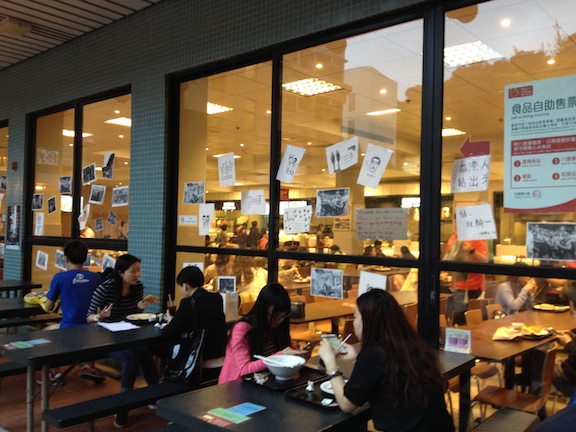
The Chinese government has responded with the same clunky hand they respond to everything with. of course facebook, twitter, Google etc is blocked, but they blocked Instagram too, to prevent images of the protests getting out. But instead of totally ignoring it, they are covering the protests from the “poor hard-working Hong Konger” perspective who’s livelihood is being ruined by these “annoying, pesky protesters” who are preventing businesses from running.
In fact, there was a scuffle a few weeks ago between “small business owners” and protesters. The small business owners were incensed that they couldn’t freely operate their businesses with the protesters taking over the streets, and they were losing lot of money. Some physically attached the protesters.
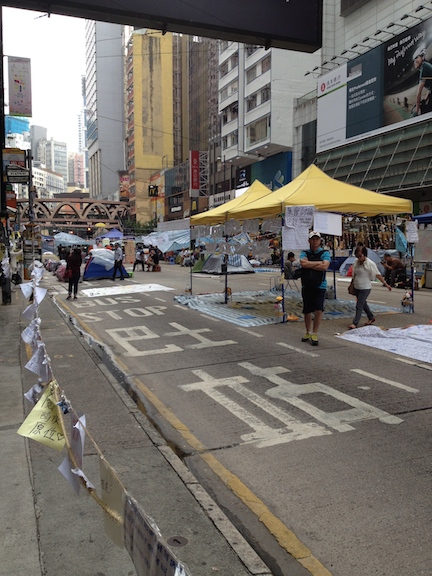
But then accusations of the “local business owners” being mainladers paid by the government surfaced. This wasn’t helped by the fact that CCTV, the government news channel, aired footage of these “local business owners” who happened to be speaking Mandarin. (Hong Kong people speak Cantonese.)
So what’s gonna happen? I’m not sure. The protesters want the current leader to resign and they want a promise of free and open elections. But knowing China, I can’t really see that happening. I guess we’ll just have to wait and see.
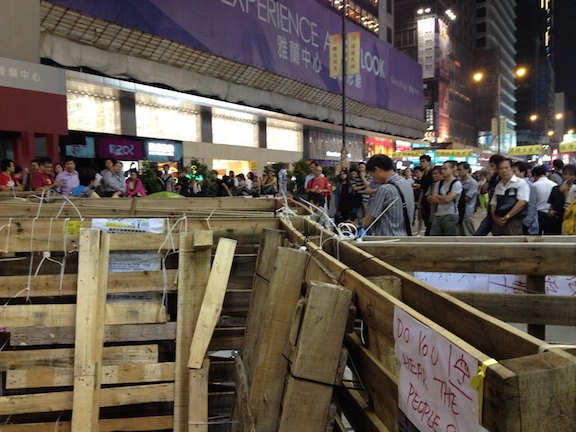



Leave a Reply